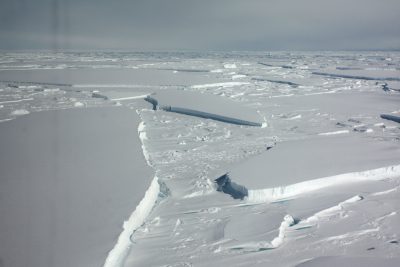Concerns raised by China’s promulgation of the term ‘use’ or ‘utilisation’ in its Antarctic diplomacy is causing mistrust in Antarctic governance.
The main cause for concern for some in the international community is China’s status as a ‘resource hungry nation’ that craves fossil fuels and minerals to feed its growing economy. In the context of the Antarctic, China’s long-term interest in the region may be motivated by the fact that the 1998 Antarctic Treaty will be up for review in 2048, which will include discussion of mining operations beginning in Antarctica.

Adding to this concern is the ambiguity surrounding China’s Antarctic agenda. China does not have comprehensive legislation or an official strategy for Antarctica. Deng Xiaoping’s 1980s slogan ‘contribute to mankind’s peaceful use of Antarctica’, which the former leader used to capture China’s position on the region, can be widely interpreted. China has so far employed the term ‘rational use’ as a reason to block negotiations on marine protected areas under the Convention for the Conservation of Antarctic Marine Living Resources (CCAMLR). The term ‘use’ in Chinese domestic laws — such as in the Law on the Protection of Wild Life — is controversial and associated with poor practice.
But does China actually have any ambitions to re-shape the Antarctic Treaty System (ATS) into a regime for resource exploitation?
China’s hunger for resources is driven by the need to fuel its rapidly growing economy. China’s economy is export driven, which means part of its demand for raw material originates from the consumption of other countries. Domestic demand for better living also contributes to growth. But the need for natural resources will stagnate when China’s population peaks in the 2030s as predicted.
Climate change could also prevent Antarctica’s mineral resources from being exploited. If the current global effort to combat climate change is sustained, then global demand for fossil fuels will reduce as sustainable energy forms increase. In regards to other minerals, profitable reserves are still available in other continents and in deep sea beds across the globe. As such, the cost of resource extraction in Antarctica will not be economically viable in the foreseeable future.
Chinese diplomacy does stress the ‘rational use’ of resources or ‘sustainable development’. Development has become China’s dominant political narrative in recent decades, leaving its footprint in both domestic policy and international diplomacy. The philosophy behind this development narrative is strongly attached to the human-centric term ‘sustainable development’, in which environmental ‘protection’ is the means to achieve the end of ‘human development’. The slogan ‘contribute to mankind’s peaceful use of Antarctica’ is no exception.
In the Antarctic Treaty Consultative Meeting (ATCM) that took place in Beijing in May 2017, China released a white paper regarding its Antarctic activities and hosted a special meeting on the ‘protection and utilisation of Antarctica’. In both the white paper and the Chinese presentation at the meeting, the term ‘use’ was used only to refer to science — including biological prospecting — and tourism.
In a press conference during the ATCM, Liu Zhenmin, Vice Minister of the Ministry of Foreign Affairs, explained that the ‘protection and utilisation’ promoted by China in the ATS framework does not include mineral exploitation. He also said that China’s scientific activities in Antarctica are not focused on the present, but rather long-term issues such as climate change. It seems that beside ‘peaceful’, the ‘for mankind’ part of Deng Xiaoping’s slogan plays the more significant role in defining ‘use’.
But despite reassurances from Chinese officials, concern regarding China’s Antarctic policies will not disappear. More can be done by China to allay such fears.
One possible avenue would be to release an official strategy paper on Antarctica, similar to the ‘Vision and Actions’ paper on the Belt and Road Initiative released in 2015. Transparency is always the best way to promote trust. If China is not ready to abandon the term ‘use’, a lot more effort is needed to explain it to the concerned global community.
China should also enhance the link between science and policy. The ‘rational use’ arguments used by China in the CCAMLR marine protected areas discussions reflects its lack of a science based support architecture to engage in substantive policy negotiations. China is currently building such support capacity, but the effects are not yet visible.
Apart from China’s rhetoric and actions, China’s domestic transition towards a green, low carbon economy will serve as the best explanation for its ambitions in Antarctica.
Source:EastAsiaForum



